Dogs are curious and funny creatures that will perform any number of clever antics and behaviors. Sometimes, these behaviors are charming and encouraged, but others can quickly become nuisances.
Dog owners often report that their dog barks at its food bowl through mealtime, demonstrating a noisy, irritating, and potentially dangerous behavior.
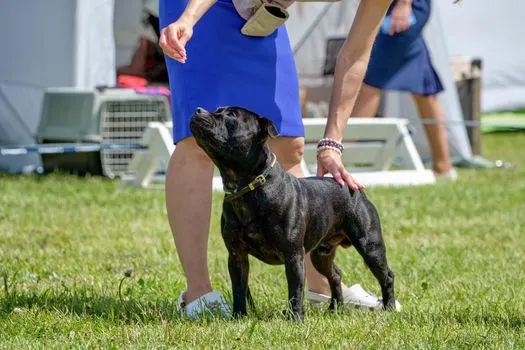 Dogs bark at their food because they demonstrate resource-guarding behavior, demand more or better food, or are frightened of their food bowl.
Dogs bark at their food because they demonstrate resource-guarding behavior, demand more or better food, or are frightened of their food bowl.
A barking dog that continues to eat may be experiencing pain in its teeth, throat, or stomach while eating.
Proper training, changing food bowls, or moving the food bowls to another room can help stop a dog from barking at its food during mealtime.
A dog demonstrating resource-guarding behavior may feel intimidated or threatened in the home.
Although resource guarding may come across as aggressive behavior, this behavior is usually the result of fear. Resource guarding can become dangerous, especially if you have other animals in the house.
Proper and positive training that is consistent and calm can help break a dog from this bad behavior. Never reward a dog practicing bad behavior, but simply offer a calm alternative to the situation.
In some cases, simply ignoring your dog until the unwanted behavior ends is an effective training tactic.
Is My Dog Guarding Its Food?
 Sometimes dogs will bark at their food because they are attempting to guard their food against other animals, or possibly people, in your home.
Sometimes dogs will bark at their food because they are attempting to guard their food against other animals, or possibly people, in your home.
Resource guarding is quite common but a harmful and potentially dangerous behavior. A dog may resource guard for several reasons.
It could be related to improper socialization or triggered by past events when food was scarce.
For whatever reason, your dog may feel threatened or unsure about its current situation. Resource guarding is typically a fear reaction compared to aggressive behavior.
Owners will sometimes report resource guarding with a dog’s food and toys, treats, and bones.
How Do I Stop Resource Guarding?
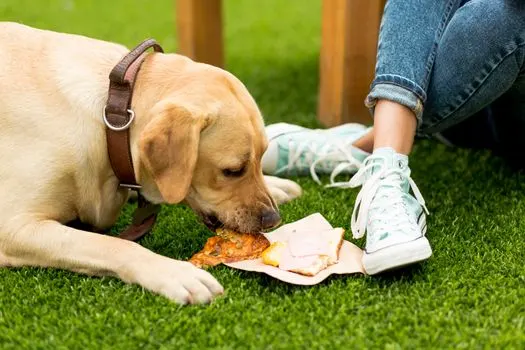 Resource guarding could potentially be a dangerous situation, especially if other animals are in the house. This behavior could lead to potential aggression and biting from animals.
Resource guarding could potentially be a dangerous situation, especially if other animals are in the house. This behavior could lead to potential aggression and biting from animals.
Every attempt should be made to try to break a resource-guarding habit. To break dogs of resource guarding, it can help to:
- Praise and Reward – Many dogs that resource guards feel threatened or intimidated. Regular praise when eating can help boost your dog’s confidence. Try to take away your dog’s food, only for a moment. Immediately praise your dog for not barking or growling, and give the food back. Prolong the time you take the food away, but always reassure your dog that the food will return. Eventually, your dog will understand its food is here to stay and does not have to worry about its food.
- Regular Schedule – Some dogs may resource guard their food because they are unsure when their next meal will be. Keeping to a regular feeding schedule can help ease your dog’s fear and get your dog into a routine. Animals like normal routines, and understanding an entire bowl of food will come at the same time every night can help boost your dog’s confidence.
- Separate Feeding Areas – A dog that barks at its food may feel threatened by other dogs or cats in the home. Try to feed your dogs in separate areas where they will not have to compete for food. Feeding dogs in different rooms may be necessary to ensure one dog will not steal food from the other.
- Individual Bowls – Give each dog its own food and water bowl so it does not have to share with other animals in the house. Dogs are incredibly reliant on their sense of smell, and even smelling another dog’s scent near its food bowl could trigger a resource-guarding response.
Resource guarding can be severe in some instances, so training will take plenty of time and patience.
It is essential to stay positive and calm while working with a dog who guards. Plenty of positive reinforcement and praise is the key to breaking this nuisance and possibly dangerous behavior.
What If My Dog Is Barking At an Empty Bowl?
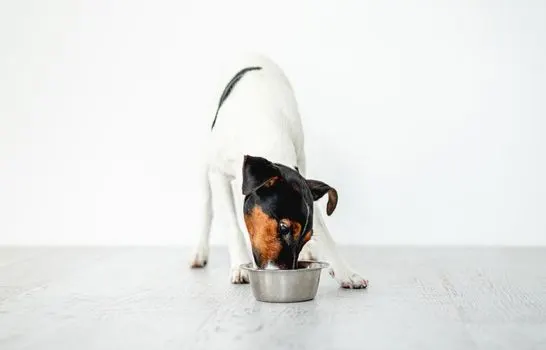 Even if there isn’t any food in your dog’s bowl, you may notice your dog barking. A dog barking at an empty food bowl could demonstrate demanding behavior.
Even if there isn’t any food in your dog’s bowl, you may notice your dog barking. A dog barking at an empty food bowl could demonstrate demanding behavior.
Your dog may be hungry, wanting more food, or may simply be asking for different, tastier food. Demanding behavior is a negative behavior that can become a nuisance with time.
The best way to break your dog from this bad habit is simply to ignore the poor behavior.
Walk away from your barking dog, and do not immediately reward your dog with more or better food.
When your dog has ceased barking, you can fill the food bowl, ultimately rewarding your dog for calm behavior.
Could My Dog Be Scared?
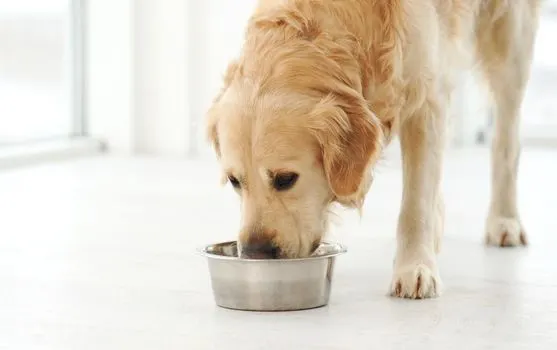 Sometimes a dog will bark at its food when scared of the bowl. The food bowl could be frightening for your dog.
Sometimes a dog will bark at its food when scared of the bowl. The food bowl could be frightening for your dog.
The bowl may smell funny, make a loud noise when your dog is eating, or project shiny reflections that could be scary.
If you suspect that your dog is barking at its food bowl because it is scared of the bowl, try changing bowl types and shapes that may be less threatening or intimidating.
Is My Dog In Pain?
Unfortunately, a dog barking at its food, especially while eating, could indicate that your dog is in pain. Something could be hurting your dog while it is eating during mealtime.
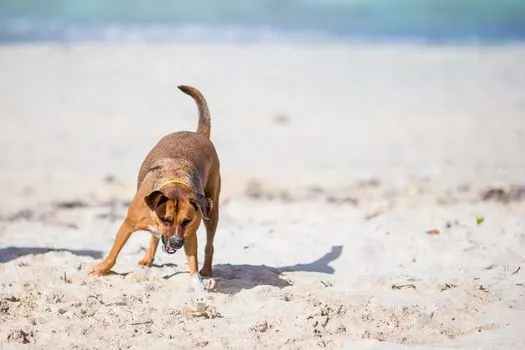 Your dog may have issues with its stomach, teeth, or throat.
Your dog may have issues with its stomach, teeth, or throat.
Health conditions that cause your dog pain while eating can be severe and life-threatening. It is always important to seek immediate veterinary care if you suspect your dog is in pain.
Some simple ways to help alleviate your dog’s pain could include switching to a different, softer food that is gentler on your dog’s teeth.
You can also try to raise the food bowl off the ground to aid digestion, making it easier for your dog to eat.
A raised food bowl can help stomach, throat, and digestion issues and is often recommended for large-breed dogs.
How Can I Get My Dog To Stop Barking At Food?
Having a dog continuously bark at food can be quite problematic, not to mention annoying.
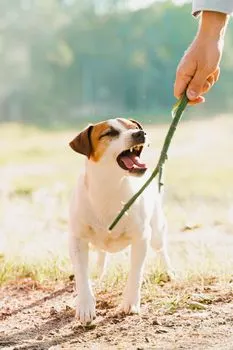 Working with a dog to break this bad habit can take time and patience, but it is possible with the right amount of training. Some great ways to get your dog to stop barking at its food include:
Working with a dog to break this bad habit can take time and patience, but it is possible with the right amount of training. Some great ways to get your dog to stop barking at its food include:
- Training – If your dog is barking at its food because of resource guarding or demanding behavior, working through training techniques is the best way to break this habit. Training should be slow yet consistent, with a positive mindset and a calm but steady voice and tone.
- Remove Collar – If your dog is barking because it is scared of its bowl, it could be because your dog’s collar is making loud and frightening sounds. A collar and tags attached to the collar can bang into the bowl while it attempts to eat or drink. Try to remove your dog’s collar for mealtime and see if the barking stops.
- Move Bowl – Your dog’s bowl location could be upsetting your dog. It may be in an area of the home that makes strange reflections, or your dog could be smelling an upsetting or threatening scent. Try to move your dog’s food and water bowls to a different part of the house to prevent your dog from barking at its food.
- Keep Calm – In many households, mealtime can be pretty chaotic, with loud noises in the kitchen. Your dog may be frightened by these sounds and pick up the stressful signs and signals you may inadvertently present. Try to keep mealtime calm and quiet to keep your dog at ease. It may be necessary to adjust your dog’s feeding times to coincide with quieter periods during the day.
Related Questions
 Why does my dog bark at me while I eat?
Why does my dog bark at me while I eat?
Some dog owners report the opposite problem: their dogs will bark at them when they try to eat. This common behavior is quite rude and demonstrates poor dog behavior.
Your dog may simply want your food and is begging for a small bite. Or your dog may be barking at your while you eat because it is seeking your attention.
An owner bent over a plate or bowl takes away the attention that may normally be directed to the dog.
What is the best dog food for my dog?
Sometimes dogs will bark at their food because they are unhappy with what they are presented for dinner. Dogs require high-quality dog food to remain healthy and happy.
Most dogs will need plenty of protein and fatty acids.
Expect to pay about $4 to $5 per pound for quality dog food. Remember that a dog’s nutritional needs will change throughout its life, so be sure to adjust your dog’s diet to its health needs and activity level.
Related Guides
Our team is composed of pet care professionals, veterinarians, and pet owners. To date, we’ve conducted thousands of hours of research to publish the most accurate pet information.
Most of the writers on our site are vets with 10+ years of clinical experience, ranging from small practice, to equine practice, academia, and surgery. Our goal is to help every pet owner get the information they seek about their dear companions.

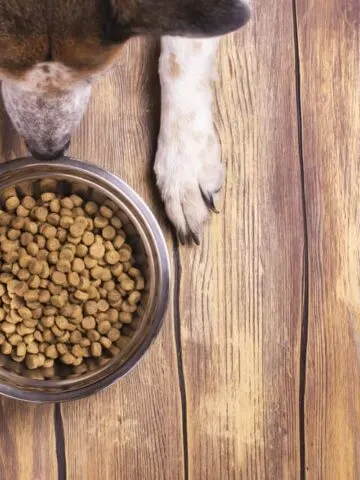

Leave a comment
You must be logged in to post a comment.